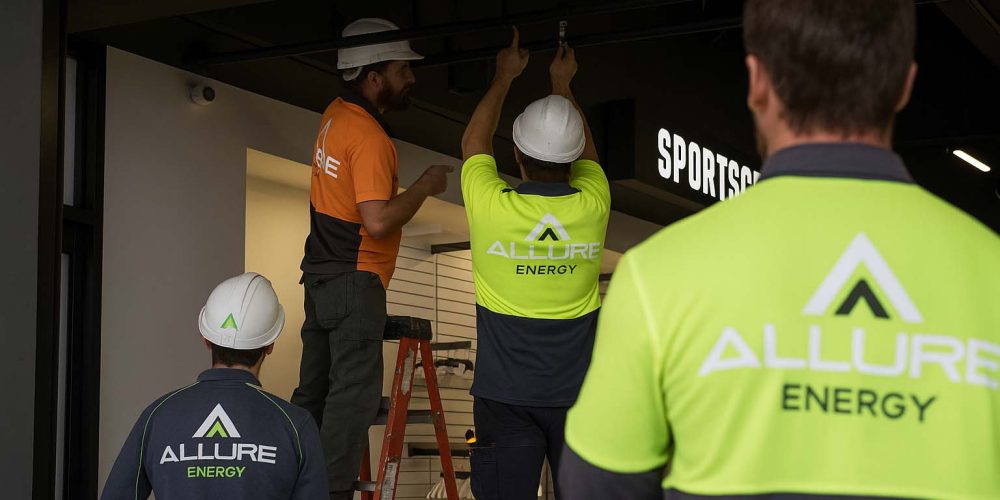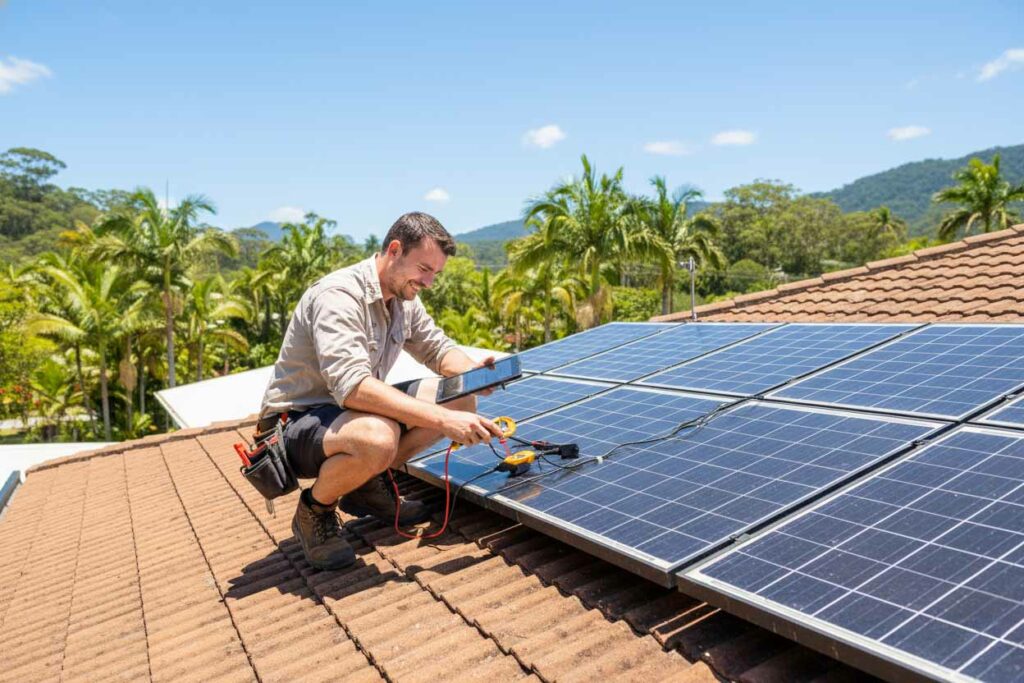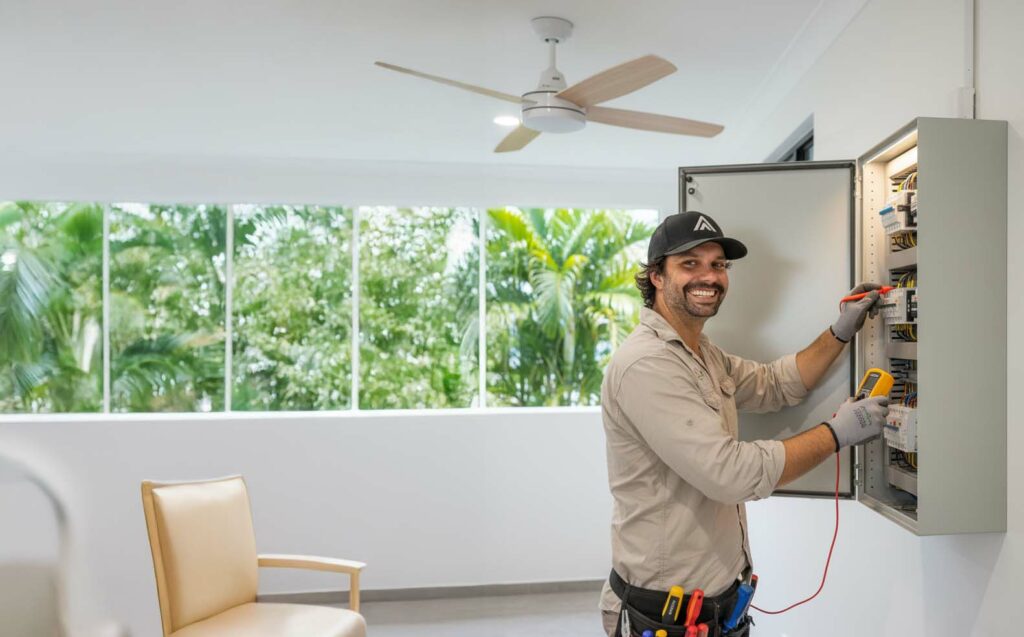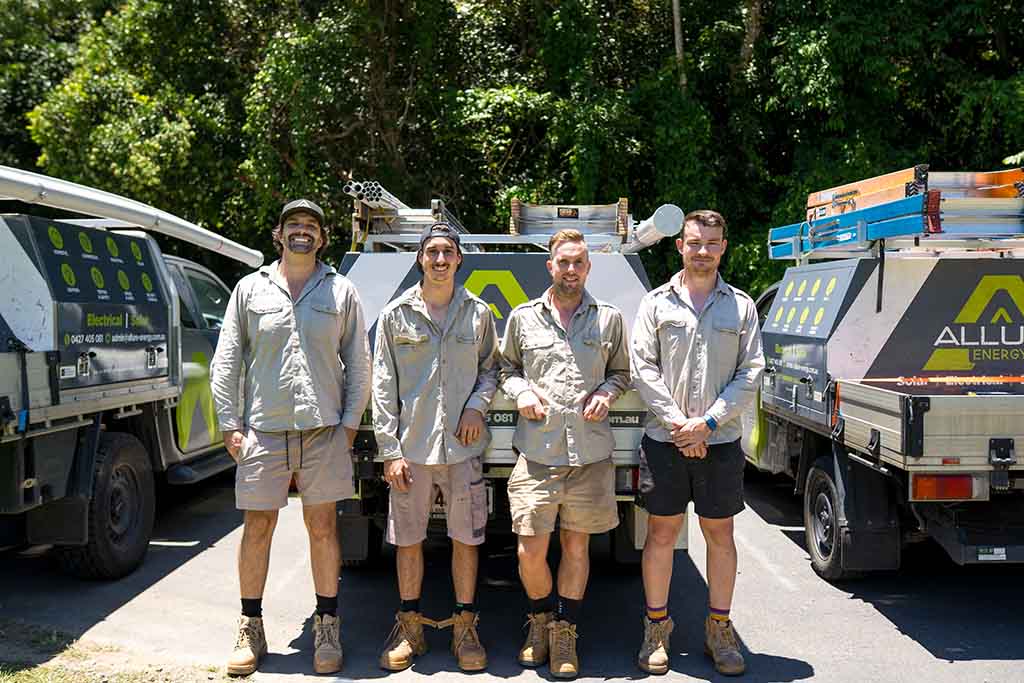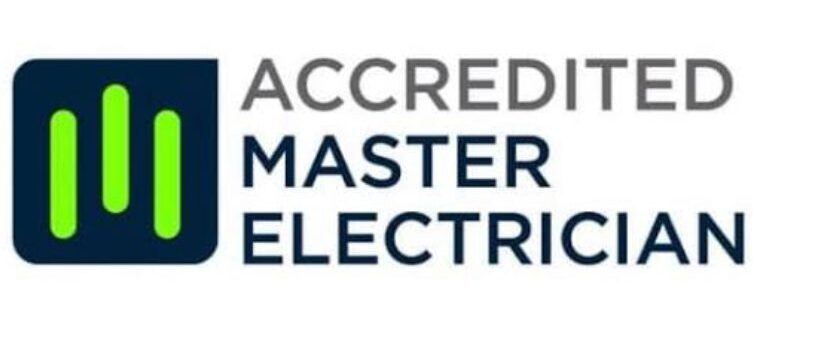When your business faces electrical issues, downtime isn’t just inconvenient—it’s costly. Whether you’re managing a bustling office in the Cairns CBD, overseeing a retail space in Smithfield, or running an industrial facility in Portsmith, having a reliable commercial electrician in Cairns can make the difference between minor disruptions and major operational headaches.
The electrical needs of commercial properties are vastly different from residential requirements. From complex switchboard systems and three-phase power installations to emergency lighting and electrical compliance certificates, commercial electrical work demands specialised expertise, proper licensing, and deep knowledge of Australian electrical standards.
In this comprehensive guide, we’ll walk you through everything you need to know about commercial electrical services in Cairns and the broader Far North Queensland region. You’ll discover when to call a professional, what services you might need, how to ensure compliance with Queensland electrical safety laws, and how to choose the right electrical contractor for your business.
Understanding Commercial Electrical Systems in Queensland
Commercial electrical systems operate on a completely different scale and complexity compared to residential installations. While your home might run on single-phase power, most commercial properties require three-phase electrical systems to handle higher power demands efficiently. This fundamental difference affects everything from the type of wiring used to the safety protocols required during installation and maintenance.
In Queensland, commercial electrical work is governed by strict regulations under the Electrical Safety Act 2002 and associated regulations. These laws exist to protect workers, customers, and property from electrical hazards that can result in serious injury, death, or significant property damage. The complexity of these regulations means that only licensed electrical contractors should perform commercial electrical work.
The typical commercial property in Cairns might include multiple electrical systems working together: general power and lighting circuits, emergency lighting systems, fire alarm and detection systems, data and communications cabling, air conditioning electrical connections, and specialised equipment power supplies. Each of these systems has specific requirements for installation, testing, and ongoing maintenance according to the AS/NZS 3000 Wiring Rules.
Understanding your electrical system’s complexity helps you appreciate why regular maintenance and professional oversight are essential. A small electrical fault in a commercial setting can cascade into much larger problems, potentially affecting multiple systems and causing extended downtime that impacts your bottom line.
Essential Commercial Electrical Services Every Cairns Business Needs
Electrical Installation and Fit-Outs
When you’re setting up a new office, retail space, or industrial facility in Cairns, proper electrical installation and fit-outs form the backbone of your operations. Commercial electrical fit-outs involve much more than simply installing power points and lights. A professional commercial electrician will assess your specific power requirements, plan efficient circuit layouts, ensure adequate capacity for future growth, and install systems that comply with all relevant Australian building standards.
Modern commercial fit-outs often include sophisticated lighting control systems, multiple data points for computers and communications equipment, dedicated circuits for sensitive electronic equipment, and integration with building management systems. The electrical design must also consider energy efficiency, with many Cairns businesses opting for LED lighting systems and smart controls that can significantly reduce ongoing electricity costs.
The fit-out process typically begins with detailed planning and consultation. Your electrician will review architectural plans, assess power requirements for all equipment and systems, design efficient electrical layouts, obtain necessary permits and approvals, and coordinate with other trades to ensure smooth installation. This collaborative approach ensures that your electrical systems integrate seamlessly with other building services like air conditioning, security systems, and fire protection.
Switchboard Upgrades and Maintenance
Your electrical switchboard is the heart of your commercial electrical system, distributing power throughout your facility and providing essential safety protection through circuit breakers and safety switches. Older commercial properties in Cairns may have outdated switchboards that don’t meet current safety standards or lack the capacity to handle modern electrical loads.
Switchboard upgrades are often necessary when you’re expanding your business, adding new equipment, or improving electrical safety. Modern commercial switchboards include advanced safety features like residual current devices (RCDs), which can detect electrical faults and shut off power within milliseconds to prevent electrocution. They also provide better organisation and labelling, making it easier to isolate specific circuits during maintenance or emergencies.
Regular switchboard maintenance is crucial for preventing electrical failures and ensuring ongoing safety. A qualified commercial electrician will inspect all connections for signs of wear or overheating, test safety devices to ensure they’re functioning correctly, check for any signs of moisture or corrosion, and verify that all circuits are properly labelled and documented. This proactive approach helps identify potential problems before they cause costly downtime or safety hazards, in line with Safe Work Australia electrical safety guidelines.
Emergency Electrical Services
Electrical emergencies don’t follow business hours, and when they occur, quick response is essential to minimise disruption and ensure safety. Common electrical emergencies in commercial settings include complete power failures, partial outages affecting critical systems, burning smells or visible sparks from electrical equipment, and safety switch trips that won’t reset.
A reliable emergency electrician service in Cairns should offer 24/7 availability, rapid response times, and the expertise to quickly diagnose and resolve complex commercial electrical problems. Emergency services often involve temporary solutions to restore power quickly, followed by permanent repairs during regular business hours to minimise ongoing disruption.
When facing an electrical emergency, your immediate priorities should be ensuring everyone’s safety, shutting off power to affected areas if it’s safe to do so, and contacting a qualified emergency electrician. Never attempt to resolve commercial electrical emergencies yourself, as the higher voltages and complex systems involved create serious safety risks that require professional expertise trained in electrical risk management.
Electrical Testing and Compliance
Queensland electrical safety laws require regular testing and compliance certification for commercial electrical installations. This isn’t just a legal requirement—it’s essential for protecting your employees, customers, and business from electrical hazards. Electrical testing and compliance involves comprehensive inspection and testing of all electrical systems to ensure they meet current safety standards.
The testing process typically includes visual inspection of all electrical equipment and installations, testing of safety devices like RCDs and circuit breakers, measurement of electrical parameters to ensure systems are operating within safe limits, and verification that installations comply with current Australian electrical standards. Following testing, you’ll receive detailed reports documenting any issues found and recommendations for remedial work.
Compliance certificates are required for various situations, including when selling or leasing commercial property, following major electrical work or renovations, and as part of regular safety audits. These certificates provide legal protection and demonstrate your commitment to electrical safety, which can be important for insurance purposes and regulatory compliance with Queensland electrical safety regulations.
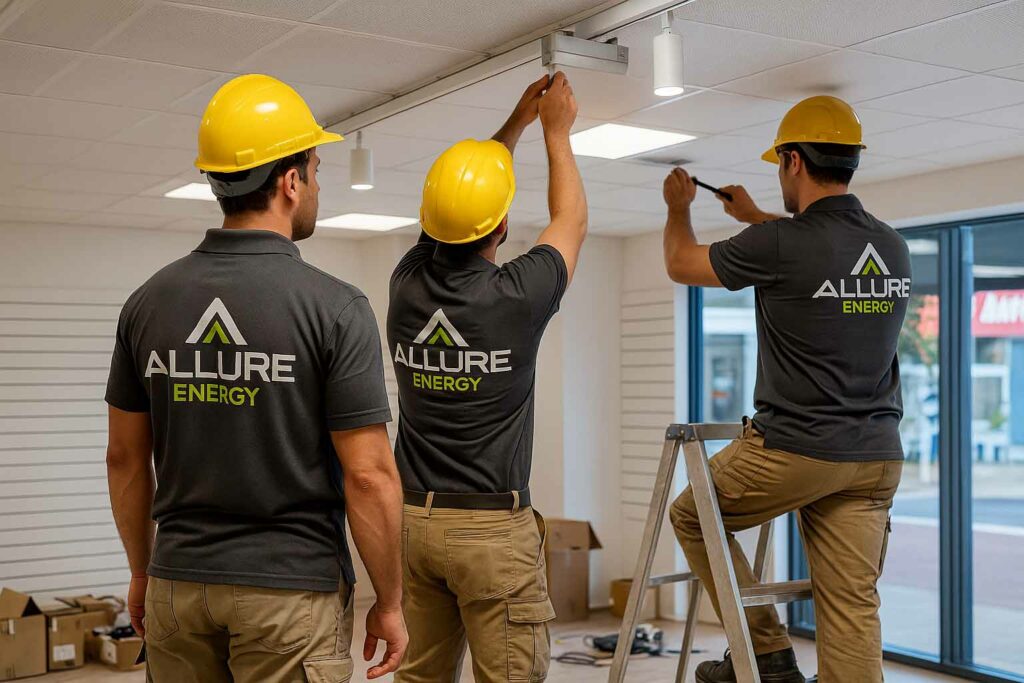
Electrical Compliance Requirements for Queensland Businesses
Understanding the Electrical Safety Act 2002
The Electrical Safety Act 2002 (Qld) establishes the framework for electrical safety in Queensland, setting out requirements for electrical work, equipment standards, and safety obligations for businesses. Under this Act, all electrical work in commercial settings must be performed by licensed electrical contractors, and specific types of work require additional certifications and approvals.
The Act defines different categories of electrical work, each with specific licensing requirements. Restricted electrical work, which includes most commercial installations and repairs, can only be performed by licensed electrical contractors. Some specialised work, such as high-voltage installations or hazardous area work, requires additional qualifications and certifications.
Business owners have specific obligations under the Act, including ensuring that all electrical work is performed by appropriately licensed contractors, maintaining electrical installations in a safe condition, and obtaining required certificates and approvals for electrical work. Failure to comply with these requirements can result in significant penalties and, more importantly, serious safety risks as outlined in Safe Work Australia’s electrical safety duties.
Certificates of Electrical Compliance
Certificates of electrical compliance are formal documents that verify electrical installations meet required safety standards. In Queensland, these certificates are required for various situations and serve as legal proof that electrical work has been completed safely and in accordance with relevant standards.
There are several types of electrical certificates you might encounter as a business owner. A Certificate of Electrical Safety is required for new electrical installations and major modifications, confirming that the work complies with relevant standards and is safe for use. A Certificate of Testing and Compliance is issued following electrical testing and inspection, documenting the condition of existing electrical installations.
These certificates must be issued by licensed electrical contractors and include detailed information about the work performed, standards applied, and any limitations or recommendations. Keeping accurate records of all electrical certificates is important for legal compliance, insurance purposes, and future maintenance planning in accordance with Queensland electrical safety office requirements.
Regular Electrical Safety Inspections
Regular electrical safety inspections are essential for maintaining compliance and ensuring ongoing safety in commercial properties. The frequency of inspections depends on various factors, including the type of business, age of electrical installations, and specific regulatory requirements for your industry.
During a safety inspection, a qualified electrician will systematically examine all electrical installations, test safety devices and protective equipment, measure electrical parameters to ensure safe operation, and identify any potential hazards or compliance issues. The inspection process is thorough and may require temporary shutdown of some electrical systems.
Following the inspection, you’ll receive a detailed report outlining the condition of your electrical systems, any issues requiring attention, and recommendations for improvements or upgrades. This information helps you plan maintenance activities and budget for necessary electrical work while ensuring ongoing compliance with Australian electrical safety requirements.
Choosing the Right Commercial Electrician in Cairns
Essential Qualifications and Licensing
When selecting a commercial electrician in Cairns, verifying proper qualifications and licensing is your first and most important step. In Queensland, electrical contractors must hold an Electrical Contractor Licence issued by the Electrical Safety Office. This licence demonstrates that the contractor has the necessary qualifications, experience, and insurance to perform electrical work safely and legally.
Different types of electrical work require different licensing levels. Restricted electrical work, which includes most commercial installations, requires an Electrical Contractor Licence with appropriate endorsements. Some specialised work, such as high-voltage installations or work in hazardous areas, requires additional qualifications and certifications recognised by Master Electricians Australia.
You can verify a contractor’s licensing status through the Electrical Safety Office website, which maintains a public register of licensed electrical contractors. This verification should include checking that the licence is current, covers the type of work you need, and includes any required endorsements for specialised work. Never engage an unlicensed contractor, as this can void your insurance and create serious legal and safety risks.
Experience with Commercial Projects
Commercial electrical work differs significantly from residential work in terms of complexity, scale, and regulatory requirements. When choosing an electrician for your business, prioritise contractors with extensive experience in commercial projects similar to yours. This experience ensures they understand the unique challenges and requirements of commercial electrical systems.
Ask potential contractors about their experience with projects similar to yours, including the size and complexity of installations they’ve completed, their familiarity with relevant Australian standards and codes, and their experience with your specific industry or type of business. A contractor experienced in office fit-outs might not be the best choice for industrial electrical work, and vice versa.
Request references from recent commercial clients and, if possible, visit completed projects to see the quality of work firsthand. A reputable contractor will be happy to provide references and discuss their experience with similar projects. This due diligence helps ensure you choose a contractor capable of delivering the quality and reliability your business requires.
Insurance and Warranty Coverage
Comprehensive insurance coverage is essential when choosing a commercial electrician, as electrical work involves significant risks and potential liabilities. Your contractor should carry public liability insurance to cover potential damage to your property or injury to third parties, professional indemnity insurance to cover errors or omissions in their work, and workers’ compensation insurance to cover their employees.
Request certificates of currency for all insurance policies and verify coverage amounts are adequate for your project. Public liability coverage should typically be at least $10 million for commercial work, though larger projects may require higher coverage. Professional indemnity insurance is particularly important for design work and complex installations where errors could have significant consequences.
Warranty coverage is equally important, as it provides protection against defects in workmanship and materials. A reputable contractor will offer comprehensive warranties covering both labour and materials, typically for periods ranging from one to several years depending on the type of work. Ensure warranty terms are clearly documented and understand what is and isn’t covered under the warranty provisions.
Strata and Body Corporate Electrical Services
Understanding Strata Electrical Responsibilities
Strata properties and body corporate buildings in Cairns have unique electrical service requirements that differ from both residential and traditional commercial properties. The shared nature of these properties creates complex responsibilities for electrical maintenance and upgrades, with costs and decisions typically shared among multiple owners or managed by professional strata managers.
In strata properties, electrical systems are typically divided between common property and individual lots. Common property electrical systems include main switchboards and distribution systems, common area lighting and power, emergency lighting systems, and shared facilities like lifts, pools, and security systems. Individual lot owners are generally responsible for electrical systems within their own units or commercial spaces.
Understanding these divisions is crucial for planning electrical work and managing costs. Work on common property electrical systems requires approval from the body corporate and is typically funded through levies or special assessments. Individual lot electrical work is the responsibility of the lot owner but may still require body corporate approval if it affects common property or building systems. Strata electrical services require specialised knowledge of these complex arrangements.
Planned Maintenance Programs
Strata properties benefit significantly from planned electrical maintenance programs that address both common property and individual lot requirements. These programs help prevent electrical failures, ensure ongoing compliance with safety requirements, and provide cost-effective maintenance by addressing multiple properties simultaneously.
A comprehensive strata electrical maintenance program typically includes regular inspection and testing of common property electrical systems, coordination of individual lot electrical maintenance, emergency response services for electrical failures, and long-term planning for electrical upgrades and replacements. This systematic approach helps identify potential problems early and ensures all electrical systems remain safe and compliant.
Planned maintenance programs also provide cost benefits through economies of scale, as electrical contractors can service multiple units or common areas during single visits. This efficiency reduces overall maintenance costs while ensuring consistent service quality across the entire property. Regular maintenance also helps extend the life of electrical equipment and reduces the likelihood of costly emergency repairs.
Emergency Response for Strata Properties
Electrical emergencies in strata properties can affect multiple residents or businesses simultaneously, making rapid response even more critical than in single-occupancy buildings. Common electrical emergencies in strata properties include main switchboard failures affecting multiple units, common area lighting failures creating safety hazards, lift electrical failures trapping residents, and emergency lighting system failures.
Effective emergency response for strata properties requires contractors who understand the unique challenges of multi-occupancy buildings and can quickly assess whether problems affect common property or individual lots. This assessment is crucial for determining responsibility for repairs and ensuring appropriate approvals are obtained before work begins.
Many strata properties benefit from establishing relationships with electrical contractors who understand their specific systems and can provide priority emergency response. This relationship ensures faster response times and more effective problem resolution, as the contractor is already familiar with the property’s electrical systems and access requirements.
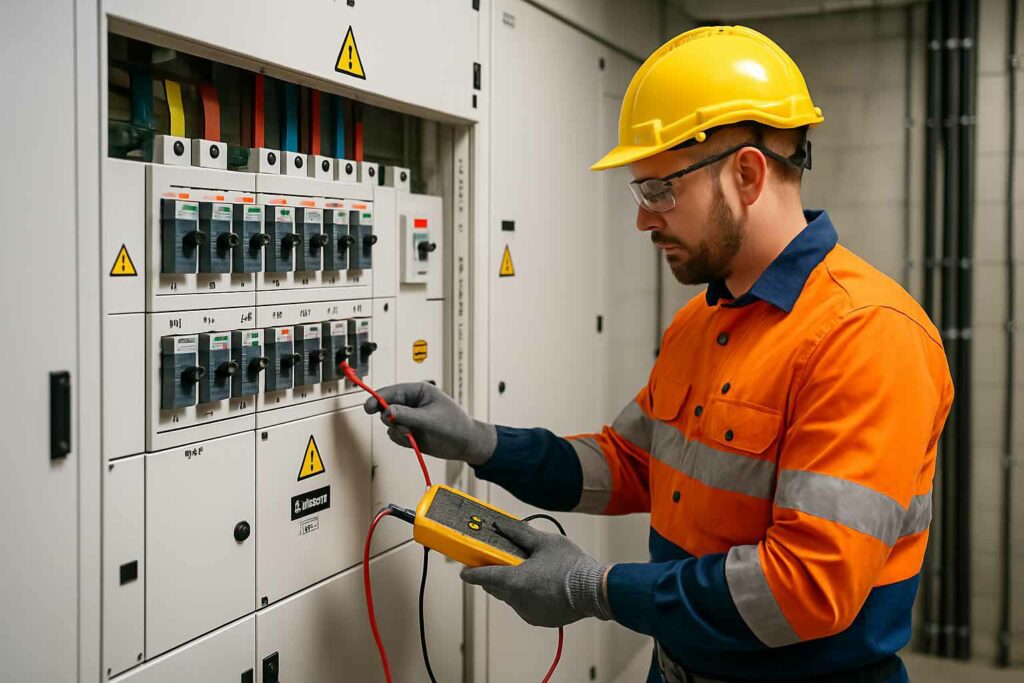
Energy Efficiency and Sustainability Solutions
LED Lighting Upgrades
LED lighting upgrades represent one of the most cost-effective energy efficiency improvements available to Cairns businesses. Modern LED lighting systems use up to 80% less energy than traditional fluorescent or incandescent lighting while providing better light quality and significantly longer service life. For businesses with substantial lighting requirements, the energy savings can be dramatic and provide rapid return on investment.
The benefits of LED lighting extend beyond energy savings to include reduced maintenance costs due to longer lamp life, improved light quality and control options, reduced heat generation that can lower air conditioning costs, and enhanced safety through better illumination and reduced fire risk. Many LED systems also offer advanced control features like dimming, scheduling, and occupancy sensing that further enhance energy savings.
When planning LED upgrades, consider factors like existing electrical infrastructure capacity, lighting control requirements, and integration with building management systems. Some older electrical systems may require upgrades to handle the different electrical characteristics of LED lighting, while modern installations can incorporate sophisticated control systems that maximise energy efficiency and user comfort.
Smart Electrical Systems
Smart electrical systems represent the next evolution in commercial electrical technology, offering unprecedented control over energy usage and system performance. These systems use advanced sensors, controls, and communication technologies to monitor and optimise electrical consumption in real-time, providing both energy savings and enhanced functionality.
Smart electrical systems can include intelligent lighting controls that adjust based on occupancy and daylight levels, power monitoring systems that identify energy waste and equipment problems, automated load management that reduces peak demand charges, and integration with renewable energy systems like solar panels. These technologies work together to create more efficient and responsive electrical systems.
The implementation of smart electrical systems requires careful planning and integration with existing electrical infrastructure. Modern installations can incorporate smart features from the beginning, while retrofitting existing systems may require additional wiring and control equipment. The investment in smart systems typically pays for itself through energy savings and improved operational efficiency.
Solar Integration for Commercial Properties
Solar power integration offers Cairns businesses an excellent opportunity to reduce electricity costs while demonstrating environmental responsibility. The abundant sunshine in Far North Queensland makes solar installations particularly attractive, with many commercial properties achieving significant reductions in grid electricity consumption.
Commercial solar installations differ from residential systems in scale, complexity, and regulatory requirements. Large commercial systems may require three-phase inverters, sophisticated monitoring systems, and integration with existing electrical infrastructure. The installation process also involves more complex approvals and grid connection requirements overseen by the Clean Energy Council.
When considering solar integration, factors to evaluate include roof space and structural capacity, electrical system compatibility, grid connection requirements, and financial incentives available for commercial solar installations through the Clean Energy Regulator. A qualified commercial electrician with solar experience can assess your property’s suitability and design a system that maximises energy production while integrating seamlessly with your existing electrical infrastructure.
Frequently Asked Questions About Commercial Electrical Services in Cairns
How often should commercial electrical systems be inspected?
The frequency of commercial electrical inspections depends on several factors, including the age and type of your electrical installation, the nature of your business, and specific regulatory requirements. Generally, commercial electrical systems should undergo comprehensive inspection every 1-5 years, with more frequent inspections required for older installations or high-risk environments according to Safe Work Australia guidelines.
New electrical installations typically require less frequent inspection, often every 5 years for standard commercial properties. Older installations, particularly those over 20 years old, may require annual inspections to ensure ongoing safety and compliance. Industrial facilities, healthcare facilities, and other high-risk environments often have more stringent inspection requirements under Queensland electrical safety regulations.
Regular visual inspections should be conducted more frequently, ideally monthly or quarterly, to identify obvious problems like damaged equipment, loose connections, or signs of overheating. These inspections can be performed by qualified maintenance staff but should be supplemented by professional electrical inspections at appropriate intervals.
What’s the difference between a commercial electrician and a residential electrician?
While both commercial and residential electricians must be licensed, commercial electrical work involves significantly different skills, knowledge, and experience requirements. Commercial electricians work with higher voltages, more complex electrical systems, and stricter regulatory requirements than their residential counterparts.
Commercial electrical systems typically operate on three-phase power rather than single-phase, require knowledge of industrial electrical equipment and controls, involve complex load calculations and power distribution design, and must comply with more stringent safety and compliance requirements outlined in the AS/NZS 3000 Wiring Rules. Commercial electricians also need experience with specialised systems like emergency lighting, fire alarm systems, and building management systems.
The scale and complexity of commercial projects also differ significantly. While a residential electrician might install a few power points and lights, commercial projects can involve complete electrical infrastructure for large buildings, coordination with multiple trades and contractors, and ongoing maintenance contracts for complex electrical systems. Master Electricians Australia provides additional training and certification for commercial electrical work.
How much does commercial electrical work cost in Cairns?
Commercial electrical costs vary widely depending on the scope and complexity of work required. Simple maintenance tasks like replacing light fittings or testing safety switches might cost a few hundred dollars, while complete electrical fit-outs for large commercial spaces can cost tens of thousands of dollars or more.
Factors affecting commercial electrical costs include the complexity and scale of work required, accessibility of electrical systems, compliance and certification requirements, quality of materials and equipment specified, and current market conditions for electrical contractors. Emergency work typically costs more than planned maintenance due to the urgency and after-hours requirements.
To manage electrical costs effectively, consider establishing maintenance contracts with qualified contractors, planning electrical work during regular business hours when possible, obtaining multiple quotes for significant projects, and investing in quality installations that reduce long-term maintenance requirements. Regular maintenance is typically much more cost-effective than emergency repairs.
Do I need special permits for commercial electrical work?
Most commercial electrical work in Queensland requires appropriate permits and approvals before work can begin. The specific permits required depend on the type and scope of work being performed, with more complex installations requiring more extensive approval processes under Queensland electrical safety laws.
Minor electrical work like replacing light fittings or power points typically doesn’t require separate permits beyond the contractor’s licensing. However, significant work like new installations, switchboard upgrades, or modifications to existing systems usually requires electrical work permits from local authorities and compliance with building codes and standards.
Your electrical contractor should handle permit applications and ensure all necessary approvals are obtained before work begins. This includes understanding local council requirements, obtaining electrical work permits, ensuring compliance with building codes, and coordinating with other regulatory authorities as required. Never proceed with electrical work without appropriate permits, as this can create legal and insurance complications.
What should I do in a commercial electrical emergency?
Commercial electrical emergencies require immediate action to ensure safety and minimise business disruption. Your first priority should always be safety—if you smell burning, see sparks, or suspect electrical danger, evacuate the area immediately and call emergency services if necessary.
For less immediate emergencies like power outages or equipment failures, start by checking whether the problem affects your entire property or just specific areas. Check your main switchboard for tripped circuit breakers or safety switches, but don’t attempt repairs yourself. If safety switches won’t reset or keep tripping, this indicates a serious electrical fault that requires professional attention.
Contact a qualified emergency electrician who offers 24/7 commercial services. Provide them with detailed information about the problem, including what electrical systems are affected, any unusual sounds or smells you’ve noticed, and whether any safety devices have operated. While waiting for the electrician, ensure affected areas are secured and consider temporary measures to maintain critical business operations if safe to do so.

Conclusion: Ensuring Your Business Stays Powered and Protected
Reliable electrical systems form the foundation of successful business operations in Cairns and throughout Far North Queensland. From the initial fit-out of your commercial space to ongoing maintenance and emergency support, partnering with qualified commercial electricians ensures your business remains powered, protected, and compliant with all relevant safety requirements.
The complexity of commercial electrical systems demands professional expertise that goes far beyond basic electrical knowledge. Whether you’re planning a new installation, upgrading existing systems, or simply ensuring ongoing compliance and safety, the investment in quality commercial electrical services pays dividends through reduced downtime, improved safety, and long-term cost savings.
As Cairns continues to grow and evolve as a major business centre in Far North Queensland, the demand for reliable, professional commercial electrical services will only increase. By understanding your electrical requirements, choosing qualified contractors who meet Master Electricians Australia standards, and maintaining your systems proactively in accordance with Australian electrical safety guidelines, you’re positioning your business for continued success while protecting your most valuable assets—your people and your operations.
Don’t wait for electrical problems to disrupt your business. Whether you need routine maintenance, emergency repairs, or planning for future electrical upgrades, Allure Energy’s team of licensed commercial electricians is ready to help. Contact us today for a comprehensive assessment of your commercial electrical needs and discover how professional electrical services can support your business success in Cairns and beyond.
Ready to ensure your business electrical systems are safe, compliant, and reliable? Contact Allure Energy today for expert commercial electrical services throughout Cairns and Far North Queensland. Our licensed electricians are available 24/7 for emergencies and ready to discuss your electrical requirements during a free consultation.

